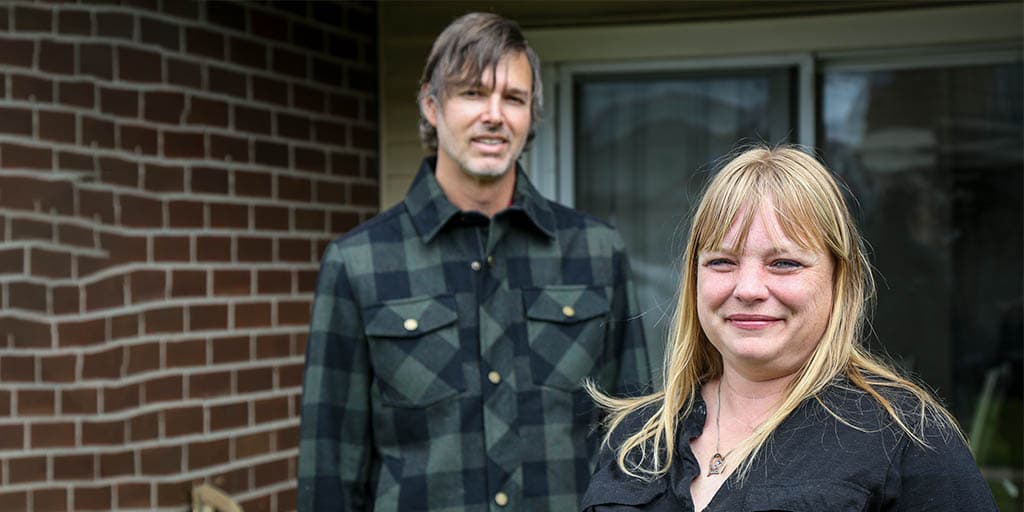

With pandemic restrictions easing as summer approaches, people from Princeton to Palmyra are planning road trips, parties, and more. Tricia Risley is brushing up on motherhood.
Tricia lost custody of her daughter eight years ago because of her mental illness. But now 15-years-old, her daughter is coming to live with Tricia for the summer – and maybe for good.
Tricia is nervous. She doesn’t have as much money as her daughter’s father, and she lives a quiet life. Will her daughter be bored? “I forget how to be a mom!” she said. “I hope I don’t make too many mistakes.”
Benjamin Watson, who works for Catholic Charities, Diocese of Trenton’s Program for Assertive Community Treatment (PACT), offered words of reassurance to Tricia: “You’ll make some [mistakes], because parents do. The key is to learn from them.”
Since 2014 Tricia has been a client at PACT, which serves people with serious, persistent mental illness and who have a history of hospitalization and risk returning to institutional settings. The goal of treatment, which includes psychiatric medical intervention, counseling, vocational training, recreational outings and transportation, is to help people live successfully in the community.
Catholic Charities has four PACT teams – three in Mercer County and one in Burlington County. As a PACT mental health advocate, Watson and other PACT team members make regular house calls to counsel and assist clients however they need.
Diagnosed at 15, Tricia lives with multiple mental disorders including severe recurring depression, borderline personality disorder, post-traumatic stress disorder, panic attacks, self-harming, and bulimia. She spent so much time in psychiatric hospitals from such a young age that they “felt like home to me.”
But with PACT’s help, Tricia has been hospital-free for over two years. Catholic Charities will honor her this September with a Client Achievement Award at its virtual Guardian Angel Benefit of Hope.
[tweet_box design=”box_01″ float=”right” width=”40%”]“I like the semi-colon as the symbol for mental illness. The semi-colon shows that the story doesn’t just end – you take a brief pause and then the story continues.” ~ Tricia Risley[/tweet_box]
“Trish has made incredible progress in her mental health journey,” Watson said. “The word I would use to describe her success lately is ‘resilience.’ Trish has been through some major life challenges, yet has remained stable and aware that she can get through these circumstances with her own coping skills and the support of her friends, family, and mental health team. She recognizes that hard times will come and go, but she can find ways to manage them and come out stronger and wiser. We are happy to see her having a much better quality of life these last months and years, and it’s due to her hard work and willingness to change and grow.”
Tricia grows bashful in the face of such praise. She knows well that there’s no cure for mental illness. Instead, you learn to cope with it, and “that takes work, it takes practice; it’s finding out what works for you,” she said. She knows many people walk her same path and work equally hard to overcome life’s challenges. But she doesn’t discount her own efforts.
“I am proud,” she said. “I do think I came a long way.”
Since she has been out of the hospital, Tricia launched a cleaning business. She self-published two books of poetry and is working on a third. She has a longtime boyfriend, and they’re considering marriage. She goes to church. She got a car and happily chauffeurs any friends-in-need on errands. She hopes to expand her cleaning business – or maybe move into a career in phlebotomy, which she studied at community college.
And then there’s her daughter. Tricia worries about her because mental illness can be inherited. Caring for her daughter gives her another reason to prioritize her own mental health.
“My responsibilities help me a lot,” she said. “Knowing that my daughter is counting on me keeps me focused and grounded.”
She credits the PACT team with teaching her coping strategies – and bringing a deep compassion to their jobs. “Even though they’re my case managers, I feel like I developed a friendship with them,” she said. They’ve also shaped her philosophy about living with mental illness.
“I like the semi-colon as the symbol for mental illness. The semi-colon shows that the story doesn’t just end – you take a brief pause and then the story continues. Maybe that brief pause is you sitting in bed for three days and not eating or brushing your hair or your teeth. But then that pause ends, and you move forward. It’s okay not to be okay, and when you’re done not being okay, you will be okay again,” she said.
“I’ve had some pretty bad days and weeks,” Tricia added. “But I also know what it’s like to be happy, so I know these days will pass and I will get happy again.”








